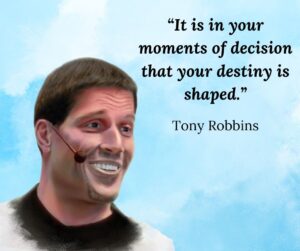Tony Robbins, a renowned motivational speaker and life strategist, once said, “It is in your moments of decision that your destiny is shaped.” This powerful statement encapsulates the essence of human agency and the transformative potential of choices. Every person faces critical junctures in life, and it is the decisions made in those moments that determine the trajectory of one’s journey. This article delves into the profound meaning of this quote, illustrating how decision-making molds destiny, provides tools for making effective choices, and explores how embracing responsibility empowers individuals to create a fulfilling life.
The Weight of Decisions
Life is an intricate tapestry woven with the threads of decisions, both big and small. From deciding what career to pursue to choosing how to respond to adversity, each choice carries weight. While some decisions may seem trivial at the moment, they can ripple outward, profoundly influencing the future. For instance, the decision to study a particular subject in school might lead to a lifelong passion, a successful career, or even a meaningful connection with others who share similar interests.
Robbins emphasizes that the act of deciding is where the power lies. This is because decisions are not merely reactions; they are declarations of intent. When someone decides, they assert control over their circumstances and set a course for their life. It is in these moments of intentionality that destiny takes shape.
The Role of Clarity in Decision-Making
To make impactful decisions, clarity of purpose is essential. Often, people struggle with choices because they are unclear about their goals or values. Without a compass to guide them, decision-making can feel overwhelming. Robbins suggests that clarity emerges from asking profound questions: What do I truly want? What is most important to me? What am I willing to sacrifice to achieve my vision?
Clarity also involves distinguishing between short-term gratification and long-term fulfillment. Many decisions are clouded by the allure of immediate pleasure, yet the most transformative choices often require discipline and foresight. For example, choosing to invest time and energy into personal growth may demand sacrifices in the present but can lead to a lifetime of prosperity and self-actualization.
Overcoming Fear and Indecision
Fear is one of the greatest obstacles to effective decision-making. Fear of failure, rejection, or making the wrong choice can paralyze individuals, leaving them stuck in a cycle of hesitation. Robbins asserts that indecision is itself a decision — a choice to remain stagnant. While fear is natural, it should not dictate one’s actions. Instead, acknowledging fear and acting despite it is the hallmark of courage.
Building confidence in decision-making involves reframing failure. Rather than seeing failure as an endpoint, Robbins encourages viewing it as feedback. Each decision, regardless of outcome, provides valuable insights that can inform future choices. This mindset fosters resilience and empowers individuals to take bold steps toward their goals.
The Ripple Effect of Decisions
Every decision creates a ripple effect, influencing not only the individual but also those around them. A single choice can inspire others, spark change, or set an example for generations to come. Consider historical figures like Martin Luther King Jr. or Rosa Parks. Their decisions to stand against injustice were not just acts of personal courage; they ignited movements that reshaped society.
On a smaller scale, personal decisions can also have far-reaching impacts. A parent’s choice to prioritize education, for instance, can inspire a child to pursue their dreams. Similarly, a decision to adopt a healthier lifestyle might encourage friends and family to follow suit. Recognizing the interconnectedness of human lives underscores the responsibility that comes with decision-making.
Tools for Effective Decision-Making
- Define Your Core Values: Understanding what matters most to you provides a foundation for consistent and meaningful decisions. When your choices align with your values, they are more likely to lead to fulfillment.
- Visualize the Outcomes: Before deciding, imagine the possible outcomes of each option. How will this decision impact your life in the short and long term? Visualization can help clarify the best path forward.
- Gather Information: While intuition plays a role, informed decisions are often the most effective. Seek advice, conduct research, and weigh the pros and cons.
- Embrace Flexibility: Not all decisions lead to the desired outcome, and that’s okay. Be willing to adapt, learn, and pivot when necessary.
- Commit Fully: Once a decision is made, commit wholeheartedly. Indecision after deciding can dilute the effectiveness of your choice and hinder progress.
Empowerment Through Responsibility
Taking responsibility for one’s decisions is a cornerstone of personal empowerment. While external factors can influence circumstances, Robbins stresses that individuals always have the power to choose their response. This concept aligns with the philosophy of Viktor Frankl, a Holocaust survivor and psychiatrist, who wrote in Man’s Search for Meaning that the ultimate human freedom lies in the ability to choose one’s attitude in any situation.
Owning your decisions fosters a sense of control and accountability. It eliminates the tendency to blame others or external conditions for life’s outcomes. Instead, it encourages proactive behavior and fosters a growth-oriented mindset. By embracing responsibility, individuals not only shape their destiny but also become role models for others seeking to do the same.
Real-Life Applications of Decision-Making
- Career Choices: Deciding to pursue a new career path or start a business requires courage and vision. These decisions often involve stepping out of one’s comfort zone, but they can lead to profound personal and professional growth.
- Relationships: Choosing to nurture meaningful relationships, let go of toxic ones, or invest in communication and understanding can dramatically improve one’s quality of life.
- Health and Well-Being: Decisions about diet, exercise, and mental health practices are pivotal in shaping physical and emotional wellness. Each small, consistent choice contributes to long-term vitality.
- Personal Development: Committing to lifelong learning, acquiring new skills, or adopting empowering beliefs can transform one’s potential and open doors to opportunities previously unimaginable.
Conclusion: Shaping Your Destiny
Tony Robbins’s assertion that “It is in your moments of decision that your destiny is shaped” is a timeless reminder of the power inherent in choice. Decisions are the building blocks of life, shaping not only individual futures but also the world at large. By embracing clarity, overcoming fear, and taking responsibility for our choices, we can harness this power to craft a destiny aligned with our deepest aspirations.
Ultimately, the question is not whether we will shape our destiny but how we will do so. The next time you face a critical decision, remember that your choice has the power to redefine your life. In that moment, pause, reflect, and choose boldly — for it is in that decision that your future will unfold.


















